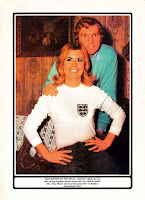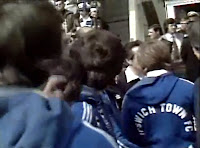The second and final part of our look at the way ITV's World of Sport created a Cup Final Day experience for all of us watching in on the box.1976Duration: 12pm to 5.10pm
Everyone remembers the novelty of seeing the Cup Final teams in their chosen hotels before the big game, and in 1976
World of Sport made it their first port of call on the day. "Up-to-the-minute news on the fitness, mood and morale of the finalists" was what we were promised, but if anything we were probably more fascinated by the sight of both teams sitting around in their smart Admiral sweaters and freshly pressed slacks.
Fred Dinenage punctuated the day's coverage with 'Man In The Crowd' (i.e. interviews with fans and celebrities) while Ed Stewart returned for a third successive year with 'Football Crazy.' On this occasion, he took Martin Buchan and Peter 'Rodreegs' Rodrigues to a local school to meet young fans of Man United and Southampton rather than enlist the help of ne'er-do-wells like Gary Glitter. No bad thing either, if you ask us.
At 1.15pm, it was time for 'Be a Soccer Commentator' - a ten-minute feature where Brian Moore "talks to the winner of a brand new competition designed to find an under-16 year old who will surely never forget
his Wembley debut." And you wondered how it all started for Clive Tyldesley...
But that wasn't the only quirky item on the agenda. An hour before kick-off, 'Cup Final Prediction' saw ITV once again aim for notoriety as Georges Bode, "famous Dutch astrologer who predicted the World Cup Finalists and result, and picked today's finalists" attempted to do the same for the 1976 FA Cup Final. Having tried to do the same with the 'ITV Computer' in 1970 and TV Times astrologer Roger Elliot in 1974, it was surely only a matter of time before someone or
something got the score right beforehand.
Luckily the Final itself did live up to expectations with Kevin Keegan, Don Revie and Jack Charlton providing Dickie Davies and Brian Moore with all the wit and wisdom they required.
1977Duration: 12pm to 5.10pm
The preamble to the 1977 FA Cup Final on ITV had a refreshingly cheeky sense of humour about it. Five minutes after
World of Sport began, Brian Moore reported from the team hotels with 'On The Ball'. At 1.20pm, it was time for 'On The Coach' - a self-explanatory and by now familiar opportunity to share the journey to Wembley with one of the teams. Then at 1.40 there was 'On The Pitch' - interviews with the players on the hallowed turf. Who says programme planners can't have fun too?
Arguably the strangest feature in the 1977 Cup Final show on ITV was 'Eurovision Penalty Prize Final'. The description, courtesy of the TV Times magazine for that week states: "Jamie Gould from Manchester, representing ITV, challenges four other young European national champions in Rotterdam's giant Feyenoord Stadium for the TV Times trophy." Now a penalty-kick competition in itself is no bad thing, but European penalty champions competing under the Eurovision banner for a trophy sponsored by the TV Times? The mind truly boggles...
As if that wasn't strange enough, there was also a chance before kick-off for viewers to win a competition by spotting 'Wembley's Wittiest Banners'. Go figure.
1978Duration: 12pm to 5.10pmThe big build-up to Ipswich v Arsenal began with 'Cup Final On The Ball' in which Brian Moore presented team news from the hotels, plus "the views of two of the country's most famous football fans - Eric Morecambe and Elton John."
After that initial bout of celebrity hero worship, however,
World of Sport opted for an altogether pared down approach for the rest of its broadcast. Gone were the eye-catching attempts to innovate, replaced by nothing more than a Golden Goals competition for viewers to enter and a raft of interviews with players on the coach, players arriving at the stadium or players standing on the Wembley pitch.
Kevin Keegan and Jack Charlton provided some punditry, but apart from that, not much to write home about.
1979Duration: 11.30am to 5.30pmAs if someone had sent a memo to ITV's Head of Sport demanding a greater sense of occasion be created, an extra 50 minutes of broadcast time were spared this year, but it wasn't necessarily used for footballing purposes, so it would seem.
Soon after
World of Sport had started, there was a 15-minute segment focusing on the European Women's Gymnastics Championships from Copenhagen. After a half-hour of Ian St.John speaking to some of the players and replaying some of the goals from previous rounds of the FA Cup, it was then time for wrestling in the first of two segments during the programme. Once the football was over and done with, there was also a second round of gymnastics to watch, too.
A by-the-numbers approach was once again used in the pre-match build-up, but a novel idea was applied in the sequence 'Matchwinners of the Seventies' where ITV tracked down all those players that had scored the winning goal in the last nine Cup Finals.
Yet again, the format for Cup Final Day on ITV looked a little tired on paper, even if it looked a little better on the screen. From here on in, though, the 1980's seemed to bring rather less in the way of innovation and freshness, relying ever more on the old ideas that worked best in the past and were easiest to achieve.
Then in 1985, it was announced that
World of Sport would no longer appear on our screens after September of that year, and so the 1985 FA Cup Final would be the last to be featured in the Dickie Davies-fronted programme.
By this point, the Wembley Conference Centre bar had become a frequent focus for celebrities enjoying a drink and a chat with Jimmy Tarbuck in the hours leading up to the game, while up in the skies, Anneka Rice was buzzing around in a helicopter (where else) to provide an aerial view of the growing crowds down below.
Saint and Greavsie put in another Cup Final shift as was becoming the norm by then, and with Martin Tyler, Jim Rosenthal and Elton Welsby doing what they do best, this was a competent, cosy and comfortable way to bring
World of Sport's biggest show of the year to an end.
The format had been set in stone, the gimmicks had been tried and the standard of broadcasting improved year on year, but the fact remained that the novelty of early starts and quirky features had well worn off by 1985. A new and ever-expanding era of live football on TV was just around the corner, and the FA Cup Final would soon have to compete for the viewers' attention with it all.
As it is, then, we're left with nothing more to do than pause and reflect on an era when the folk of ITV Sport - in front of and behind the cameras - tried their utmost to create a great sense of occasion for all of us watching on the big day. Though some of the ideas failed to hit the spot, there were undoubtedly some successes and in the round it's a combination of the two that will ensure the memory of ITV's Cup Final Day will linger on for many years to come.























































